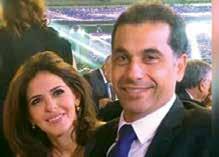
5 minute read
“Miss Mishka” retires
Board Member Imad Taher, honoring Mishka Mourani during Teacher’s Day Dinner
Sit down graduates of the 70s and 80s and brace yourselves: Miskha Mojabber is retiring. Yes, the loveable blond hair English teacher “Miss Mishka” is leaving IC.
How can that be? Wasn’t it just yesterday that the junior from AUB arrived to campus?
Actually, that was in 1975. The civil war had just started. Many newly hired foreign English teachers cancelled their move to Lebanon. In desperation, IC turned to the AUB English department who sent a young moppet of a girl – barely older than the students she was to teach. But MojabberMourani (since 1993) already had five languages under her belt. She was after all, studying to be an interpreter. She had moved to Lebanon only two years before from Australia – her adolescent home - and was planning to move on to Geneva after earning a BA in English Literature.
Edmond Tohmé, then Middle School Director, hired her on the spot. Little did anyone know that this inexperienced teacher would end up leading the school and playing an instrumental role in keeping it open during the country’s vicious 15-year civil war.
Of course, she had to deal with some problems at the beginning: convincing colleagues that she was indeed a teacher and not a student. In one famous story during her early days, she was barred from entering Rockefeller Hall during recess. Not only that, but she was scolded for her bold claim of being a teacher. It was finally her Department Chairman, Thomas Weaver, who vouched for her.
Fortunately, she had a keen sense of humor and quickly became one of the alltime favorite teachers in the school with a long line of admirers in tow.
Soon enough, ‘Miss Mishka’ became synonymous with ‘IC’.
Meanwhile, Mourani seems to have forgotten her dream of becoming an interpreter. “Teaching became my passion,” she said.
Despite a heavy teaching schedule, she managed to obtain her Bachelor’s with distinction, a Master’s in Literature and a Diploma in Administration.
Still, the war continued and Mourani often found herself unable to go home.

During an especially long battle in 1976, she spent three weeks sleeping in a little storage room at the top floor of Sage Hall.
In the late seventies her parents moved to Athens. Mourani chose to remain in Beirut. She was attached to the school.
“The kids would spend the night at a shelter or study by candlelight but come anyway,” she said. “If they could come, so could we. It was not up for negotiation. It was a tacit contract.”
IC had to survive. While the war raged outside its doors under the guise of religious fervors between 18 different sectarian dominations, inside there was nothing but tolerance.
“IC offered an oasis of peace for us,” she said. “There were some real horror stories outside, some real tragedies. But here, we were all attached and committed to our students, to the mission of IC, to providing an exemplary education.”
By all accounts, IC should have closed. The risk was just too high. But dedicated personnel kept it going. Day after day. Year after year.
Mourani’s Australian passport – her way out – was kept tucked away. “I wasn’t leaving,” she said. “I refused. I was committed to my life here.”
In 1991, the war ended. IC had survived. But it was a somewhat different IC. “The commitment of the people who kept it open became a large part of the identity of the school,” said Mourani. Moreover, the school flourished. “Never did I feel we were stagnating. Not only did we survive, we grew.” (In fact, today’s mission statement is a series of beliefs which were directly derived from IC administrators’ personal lessons learned from the Lebanese civil war).
Meanwhile and despite the raging war, Mourani threw herself into her career. In 1978, the Educational Resource Center (ERC) asked for her help in launching the Sultan School in Oman as part of a team. She travelled to Muscat to teach with four other colleagues.
It was a turning point. Mourani became a consultant for the ERC. She had discovered her second passion: teaching teachers.
She eventually served on the professional development advisory board of NESA (Near East and South Asia Council of Overseas Schools) where she helped set the program of speakers and workshops of the four annual events - conferences and institutes - attended by up to 1500 people from 40 international schools - geared towards heads of schools, leadership cadres and educators.
Following her service as Director of the Elementary, Middle, and Secondary schools, in 1998, Mourani was appointed as the school’s Senior Vice President. Twice during her career, she found herself serving two posts simultaneously: Director of the Elementary and Middle schools in the early nineties, and later, Director of the Secondary School and Senior Vice President. During that period, IC was accredited for the first time by both NEASC and ECIS.
In the 1990s, IC participated in the revision of the Lebanese National Curriculum. The following decade also saw the introduction of the IB Diploma at the Secondary School and PYP (Primary Years Program) in the preschool and elementary levels. Mourani also focused on the French Baccalaureate and IC regained its official AEFE status of “établissement homologué”. The school was reaccredited by NEASC & ECIS in 2008.
“The success of IC has always been a community effort, and I am so blessed to have been a part of this community for the past 42 years,” she said. “IC has been a constant in my life. I am very much part of the fabric of the school and the school is very much part of the fabric of who I am.”
One thing is for sure: The ‘Miss Torch’ and ‘Miss IC’ of the past and coming years will come and go. But no one will ever forget the actual ‘Miss’ of them all: Mishka Mojabber Mourani.
Thank you and Happy Retirement Miss Mishka.











